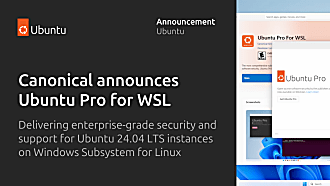haydenb
on 9 December 2019
Canonical sponsors WSLConf at Microsoft HQ
Canonical is announcing today it will be a featured sponsor of WSLConf, the first conference dedicated to the Windows Subsystem for Linux (WSL) platform. WSLConf is scheduled for March 10th-11th, 2020 and is being held on the campus of Microsoft’s headquarters in Redmond, Washington. The conference brings together developers, start-up founders, academics, enterprise, community members, and teams from Microsoft and Canonical around Windows Subsystem for Linux. The conference will include two densely-packed days of presentations and workshops on the latest developments on the rapidly evolving platform.
Ubuntu first partnered with Microsoft to bring Bash on Ubuntu on Windows to users in 2016 with the Windows 10 Anniversary Update. Bash has since evolved into Windows Subsystem for Linux. WSL is a stable and mature Linux platform for cross-platform development, DevOps, and system administration built directly into Windows 10. At Build 2019, Microsoft announced WSL 2 with performance improvements based on a Linux kernel. Ubuntu is the most popular distribution choice for WSL. Ubuntu is continuing it’s leading role on WSL by supporting WSLConf and fostering the development community around WSL.
Some of the scheduled speakers for WSLConf include:
- Ben Hillis, Lead Software Engineer, Windows Subsystem for Linux, Microsoft
- Kayla Cinnamon, Project Manager, New Windows Terminal, Microsoft
- Simon Ferquel, Software Engineer, Docker Desktop for Windows, Docker
- Hayden Barnes, Developer Advocate, Ubuntu on WSL, Canonical
- Erika Sweet, Project Manager, Visual Studio, Microsoft
- Nuno Do Carmo, Senior IT System Analyst, Ferring Pharmaceuticals
- Carlos Ramirez, Lead Developer, Pengwin, Whitewater Foundry
- Jinming Wu, Lead Developer, wslutilities
- Dax MacDonald, Software Engineer, Rancher Labs
Presentations at WSLConf will include the following topics:
- Build, test, and deploy with Kubernetes on WSL
- Accelerating Internet of Things development with WSL
- The latest news from the WSL and Windows Terminal teams
- Demos of WSL integration with Visual Studio and JetBrains IDEs
- A technical deep-dive on the new WSL2-based Docker Desktop for Windows
- Question and answer session with Ben Hillis, the lead developer of WSL
- How to secure WSL deployments in the enterprise environment
- WSL for long-time UNIX system administrators
A complete listing of speakers and additional information for WSLConf can be found on wslconf.dev. Conference attendance is free but registration is required and space is limited. A live streaming only option is available for those who cannot travel to Redmond.
See the Canonical Privacy Notice for Events. Attendees must adhere to the Microsoft Code of Conduct and Ubuntu Code of Conduct. Discounted hotel rates are available until February 10, 2020.



